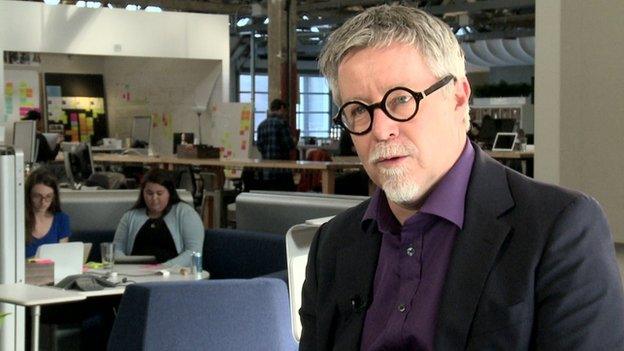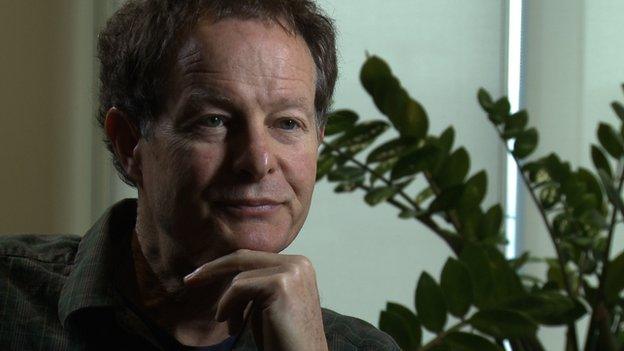Why businesses may need to start hiring biologists
- Published
As businesses grow bigger, they tend to become more complicated and more bureaucratic.
Business and biologists don't seem obvious bedfellows unless perhaps in a pharmaceutical or healthcare setting.
Yet Tim Brown, chief executive of design agency IDEO, is convinced the combination is the future and says he has already hired "several".
"They're really changing the way we think," he says enthusiastically.
And that fresh perspective is exactly what he believes not just his firm, but businesses in general will need to enable them to adapt and find new profitable niches in an increasingly competitive market.

Thinking of businesses as mechanical machines cranking out products is outdated, says IDEO's Tim Brown
"We think of a business as a machine. I don't think that's appropriate in the future.
"The way we will think about business and society will be much more based on biological metaphors, on the way ecosystems work, because they're much more complex and much more adaptive," he says.

IDEO boss Tim Brown says it encourages staff to experiment
'Mind bogglingly complex'
At IDEO, staff are sent on secondments to different international offices to ensure they experience different ways of working and living, giving them a wider perspective.
Mr Brown says the firm also aims to create an atmosphere where employees feel free to try new ideas out, regardless of whether or not they are successful.
For a firm like IDEO , which employs just 550 staff and whose work is based on individuals' knowledge and skill, changing how it does business can be relatively painless and fast.
But for bigger companies the process can be much harder as inevitably the larger a firm gets the more people have to agree and approve any changes before they are put into action.
Leadership expert Steve Tappin says larger firms often become "mind bogglingly complex", making change very difficult.
"Most big businesses create bureaucratic processes to deal with their expansion. The key for chief executives is not to control complexity but to build organisations which can respond intelligently and adaptively," he says.
Looking forward

Cardinal Health has had to react to a growing older population
When George Barrett joined US healthcare services firm Cardinal Health in 2008 as chief executive, the entire industry was changing due to a significant demographic shift, with the older population expanding rapidly, and a sharp growth in some health issues such as obesity.
Because the firm operated on very small profit margins, the performance of staff and different units was constantly measured to ensure it was on target, but he says the "dark side" of being so focused on the detail was that the firm was missing these bigger external shifts in the market.
"Part of my job was about bringing a different perspective," he says.
As a result, he says the firm started to look forward more, making some bets on which services would be in demand in the future and ensuring it hired people qualified in those areas.
This included deliberately hiring people, he says, which were not like him or other people in the organisation, avoiding the "recipe for disaster" which he says surrounding himself with similar people would have been.
"You sometimes have to give the voice to that heretic who drives everybody crazy but at least is stirring up enough new thought."

Boots owner Stefano Pessina has done several mergers
Tiny office
Stefano Pessina, executive vice chairman of newly-merged firm Walgreens Alliance Boots, is equally careful to make sure the views of those at the top don't become too dominant.
An entrepreneur all his life, Mr Pessina has grown the family firm he inherited from his father into a giant through constant mergers.
But he's careful to ensure the larger firm retains its entrepreneurial edge.
In fact, it regularly cuts people at the top of the firm to keep the organisation "very lean" and to make sure that it doesn't become too bureaucratic.

Whole Foods' John Mackey says those at the top need to understand the different interrelationships which exist in business
"What is important is to have a lot of people where the customers are. It's not important to have people just in the corporate offices, because many people in the corporate offices have never seen a customer," he says.
He, himself, he says only has a tiny office, to emphasise the point that its customers and the staff serving them are the most important part of the organisation.
Ultimately, says John Mackey, chief executive at supermarket chain Whole Foods, those at the top have to ensure that they have a solid understanding of all the different relationships which exist in the business: those between suppliers, staff, investors and customers, for example.
"We need leaders who have a higher degree of systems intelligence that can see how it all fits together and that understand the importance of creating value for all of these stakeholders. It's a different kind of leader to who we typically have," he says.
Maybe a biologist is the person for the job, after all.
This feature is based on interviews by leadership expert Steve Tappin for the BBC's CEO Guru series, produced by Neil Koenig.